Regency Era Prime Ministers-Robert Peel
Regency History
Often in my research I keep needing to find who was leading the government and do this through every book. I thought that having the list handy would be good, and then turning it into a research webpage even better. Here is the list. After I post a few more Timeline years and write some more, I will work on the web page with notes about each PM.
The last PM I am doing of the Regency Era (which we define as from the first Madness of George III to the Coronation of Victoria) is Robert Peel, and I am hosting a page devoted to him and then all our period PMs at Regency Assembly Press. That page is here.
William Henry Cavendish-Bentinck, 3rd Duke of Portland
04/02/1783
12/19/1783
Whig
William Pitt the Younger
12/19/1783
03/14/1801
Tory
Henry Addington 1st Viscount Sidmouth, “The Doctor”
03/14/1801
05/10/1804
Tory
William Pitt the Younger
05/10/1804
01/23/1806
Tory
William Wyndham Grenville, 1st Baron Grenville
02/11/1806
03/31/1807
Whig
William Henry Cavendish-Bentinck, 3rd Duke of Portland
03/31/1807
10/04/1809
Tory*
Spencer Perceval
10/04/1809
05/11/1812
Tory
Robert Banks Jenkinson, 2nd Earl of Liverpool
06/08/1812
04/09/1827
Tory
George Canning
04/10/1827
08/08/1827
Tory
Frederick John Robinson, 1st Viscount Goderich
08/31/1827
01/21/1828
Tory
Arthur Wellesley, 1st Duke of Wellington
01/22/1828
11/16/1830
Tory
Charles Grey, 2nd Earl Grey
11/22/1830
07/16/1834
Whig
William Lamb, 2nd Viscount Melbourne
07/16/1834
11/14/1834
Whig
Arthur Wellesley, 1st Duke of Wellington
11/14/1834
12/10/1834
Tory
Sir Robert Peel, 2nd Baronet
12/10/1834
04/18/1835
Conservative
William Lamb, 2nd Viscount Melbourne
04/18/1835
08/30/1841
Whig
Tory* (Tory government, PM a Whig)
Robert Peel, 2nd Baronet
“Orange Peel”
Born 02/15/1788 Bury, Lancashire
Died 07/02/1850 London
Major Acts:
His major acts were when he served his second term in the Victorian Era, the Factory Act and Importation Act.
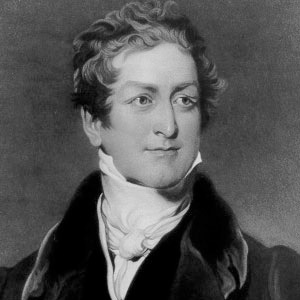
Robert Peel’s period in government – as prime minister and in other offices – was a milestone for social reform. Landmark legislation cut working hours for women and children, created cheap and regular rail services, and reorganized the policing of London, changing society in radical ways.
The other achievement for which he is known – repealing the Corn Laws in 1846 – split his party, but earned him lasting popular fame as a humanitarian gesture.
Robert Peel was the son of a wealthy Lancashire cotton mill owner who was also Member of Parliament for Tamworth. It was a new-money background which some in his party would later use to goad him.
Peel’s father was extremely ambitious for him, grooming him for politics and buying him his Commons seat. It is claimed that he told his son ‘Bob, you dog, if you do not become prime minister some day I’ll disinherit you’.
He was educated at Harrow and Christ Church, Oxford, where he excelled, gaining a double first.
Just one year later, in 1809, Peel was elected MP for Cashel, Tipperary, though he was to represent many constituencies during his career, including that of Oxford University.
Considered an arch-unionist, and at that time opposed to Catholic emancipation, he was nicknamed “Orange Peel”.
In 1822 he became Home Secretary after voluntarily resigning his position in Ireland in 1817. During his time, he introduced a number of important reforms of British criminal law.
His changes to the penal code resulted in around 100 fewer crimes being punished by death. He also reformed the gaol system with payment for jailers and education for the inmates. He retained the post of Home Secretary under Wellington in 1828.
Shocking turnaround
During this time Peel was persuaded of the case for Catholic emancipation after twenty years of opposition to it, and pushed the Catholic Emancipation Bill through Parliament, arguing that civil strife was a greater danger. His turnabout on the matter shocked his supporters.
As Home Secretary Peel also created the Metropolitan Police in 1829, leading to the nicknames of “Bobby” (which still endures) and “Peeler” for London’s police officers. On Earl Grey’s resignation in 1834, Peel refused King William IV’s invitation to form a government.
However, he did accept a second request the following year. He lost no time in calling fresh elections, in the hope of winning a large majority.
But the majority Peel won in the election was small, and a number of defeats in Parliament led to his resignation in April.
Peel became PM for the second time in June 1841. It was a time of economic strife, with many out of work and Britain’s international trade suffering. Peel, though never an ideological free trader, took steps to liberalise trade, which created the conditions for a strong recovery.
Peel also passed some groundbreaking legislation.
For example, the Mines Act of 1842 forbade the employment of women and children underground and The Factory Act 1844 limited working hours for children and women in factories.
Failed harvests
In 1845, Peel faced the defining challenge of his career. Failed harvests led much of the population to call for the repeal of the 30-year-old Corn Laws that forbade the import of cheap foreign grain. The crisis was triggered by the Irish potato famine. Unable to send sufficient food to Ireland to stem the famine, Peel eventually decided the Corn Laws must be repealed out of humanity.
But land-owners saw the attempt as an attack on them, and fiercely protested in the House of Commons. Peel’s Conservative Party would not support him, and the debate lasted for five months.
Eventually, in June 1846, the Corn Laws were repealed. However, on the very same day Peel was defeated on another bill, and resigned for the final time.
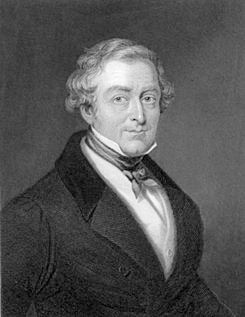
“There seem to me to be very few facts, at least ascertainable facts, in politics.”
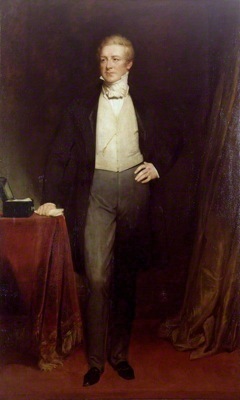
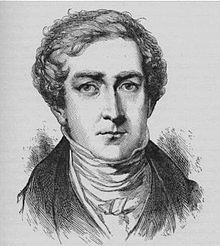
First Ministry Under William IV
12/10/1834 04/18/1835
OFFICE
NAME
TERM
First Lord of the Treasury,
Chancellor of the Exchequer
Leader of the House of Commons
Sir Robert Peel, Bt
December 34–April 1835
Lord Chancellor
The Lord Lyndhurst
December 34–April 1835
Lord President of the Council
The Earl of Rosslyn
December 34–April 1835
Lord Privy Seal
The Lord Wharncliffe
December 34–April 1835
Home Secretary
Henry Goulburn
December 34–April 1835
Foreign Secretary
Leader of the House of Lords
The Duke of Wellington
December 34–April 1835
Secretary of State for War & the Colonies
The Earl of Aberdeen
December 34–April 1835
First Lord of the Admiralty
The Earl de Grey
December 34–April 1835
Master-General of the Ordnance
Sir George Murray
December 34–April 1835
President of the Board of Trade
Master of the Mint
Alexander Baring
December 34–April 1835
President of the Board of Control
The Earl of Ellenborough
December 34–April 1835
Paymaster of the Forces
Sir Edward Knatchbull, Bt
December 34–April 1835
Secretary at War
John Charles Herries
December 34–April 1835
Peel’s Second Ministry was during the time of Victoria.
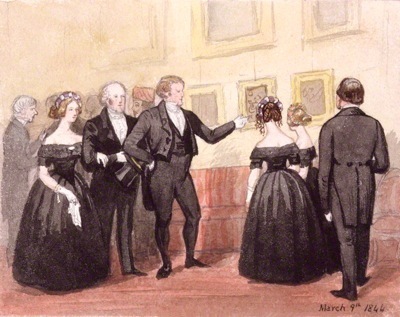
Family
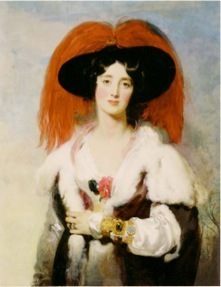
Peel married Julia, youngest daughter of General Sir John Floyd, 1st Baronet, in 1820. They had five sons and two daughters. Four of his sons gained distinction in their own right.
His eldest son Sir Robert Peel, 3rd Baronet, served as Chief Secretary for Ireland from 1861 to 1865. His second son Sir Frederick Peel was a politician and railway commissioner. His third son Sir William Peel was a naval commander and recipient of the Victoria Cross. His fifth son Arthur Wellesley Peel was Speaker of the House of Commons and created Viscount Peel in 1895.
His daughter Julia married the 6th Earl of Jersey. Julia, Lady Peel, died in 1859. Some of his direct descendants now reside in South Africa, the Australian states of Queensland, Victoria and Tasmania, and in various parts of the United States and Canada.
The Writing Life
My current writing project, a Fantasy, the third part of my trilogy on the son of Duke. It is the third in what I started when I left college. I finished the second part about 2 years ago, and so now I will wrap it up and reedit it all. It is tentatively titles, Crown in Jeopardy, the third book in the Born to Grace tale.
It opens with our hero setting up a trap for the enemies.
Chapter 2: Cynwal’s Folly (Conclusion)
Caradoc swung again and let the tip of his sword fall to the level where the man’s neck was. He extended his arm enough so that three inches of blade crossed across the man. It was enough to cut past any defenses and draw blood. His throat separated. He was dead and had not known it, even as the hand that used to grip his shield rose to clasp itself about his torn and bloodied neck. With his shield, Caradoc extended his arm fast into the man who was not concentrating on the fight. It made him lose his balance, and the enemy fell then to the ground, his horse free, scurried away from the battle.
Then, as if he did not have enough to worry about with a battle all around him, he felt a fire lance sizzle by his left shoulder. Another man had been riding towards him to attack. That man was blown out of his saddle by the fire lance. Clearly one of the Magus, and most likely William, was being helpful. Two of the bodyguards that served under Jamus took place in front of Caradoc. And then more men were charging them. He and those with him, were intentionally targets for Cynwal to rally against. Caradoc wanted the enemy Clanrex to send as many men to attack as he could.
It would allow the real mission of Avram and General Frederick the best chance to succeed.
The attackers were increasing there assault. “Back lord,”
“Please Caradoc, behind us.” More of his men were circling near to protect him.
Cynwal and his men were forcing their way closer. And a few fire lances, when there seemed to be a clear shot, came forth. “Very well, I shall move back a few paces.” Caradoc said, but he was not sure that anyone heard him. It was quite noisy.
“MacLaughlin! I’ll kill you!” he heard a shout and knew that was Cynwal. The man had three others between them, but he led from the front of his men. Just as Caradoc had led when he chased Hyfaidd. When Hyfaidd had taken Clarisse.
“Come Clanrex. Come forth and kill me. Or I shall see you dead! I have already killed your murderous fool of a son. Do you think I would not kill the imbecile of a father!” Caradoc shouted. He wished he had William or another Magus invoking a spell to make his words heard above the din.
“I will kill you!” the Clanrex shouted.
Caradoc just stood in his stirrups. “I. Killed. Hyfaidd!” That last must have heard for more than fifty feet for heads turned his way. Men had to have heard. “MacLaughlin!” he shouted and the men near took up the answering cry.
And then when it was repeated again, thousands once more shouted it. That did not sit well with the Clanrex who tried to get to Caradoc
Damn, he thought. His guards and soldiers were not going to let the Clanrex through, and he was fighting very competently. Soon Caradoc knew that the men the Clanrex battles would fall. Most were not as good as the Clanrex, or of himself.
There!
There was a moment that he could spur his horse and charge straight at the man.
His men did not see it, but he could do so if it came again. Caradoc looked to see Jamus, only to find that his chief bodyguard was busy with the men of Cynwal.
“I shall kill,” Cynwall was shouting as he traded blows with men of Caradoc’s guard. Then Caradoc saw the break he needed and spurred his horse, bringing his sword around to the right and falling down to the rear side of his horse using his wrist to get momentum. He was attempting to bring his sword in a large circle, like a windmill. As he neared Cynwal he wanted the sword to be snapping up quickly and then pass over the head of his own horse.
He had practiced such a move countless times. For he had been riding even longer than he had been using a sword, and once he was allowed to use a sword as a squire, he had practiced all forms of combat from the saddle, as well as upon his feet on the ground. The enemy had trouble seeing where the sword was coming from when a rider held it below and to the backside of a horse.
They might guess, but Caradoc also used his shield to hide his intentions as well. How quickly he would snap his wrist up and over was the critical part of the attack. And in this fight, as all were different, how well distracted Cynwal was by anger and the other men that faced him were also important. Caradoc had to contend with wedging his horse between one of the guardsmen who traded blows with Cynwal and the Clanrex. Another of his guardsmen was on Cynwal’s other side.
“Robert, the right!” he called and hoped Robert understood to move his horse a foot or two. The horse would when he sensed another rider approach, but should Robert move as well, then it would be better for Caradoc’s attack. Robert would give him the room to finish the maneuver with the sword. That was to be crucial.
Cynwal had men though as well trying to support the attack. More men at this part of the field then Caradoc. Men who would become, he hoped and expected, disheartened if the saw the Clanrex fall. And the Clanrex had thrown most precautions from him when he sought to attack Caradoc forcefully.
Passion did not have much place on the battlefield. It was detrimental. You lost focus as anger clouded your mind. It caused mistakes. Caradoc knew all this, and was sure that Cynwal knew it as well.
Yet the man was blinded by his desire to kill Caradoc. And as Caradoc closed he forget that there was man on his own right. Jamus, was not in the mood to allow Caradoc to risk his life either.
So as Caradoc came within range of the Clanrex, that man rose in his saddle to place his shield towards Caradoc and defend against the sword that Caradoc was swinging. Cynwal also moved his sword trying to deflect a swing of Jamus, the Clanrex trying to move his sight between the two men, and still worried for the other bodyguard of Caradoc’s was close as well. Robert had tried to hook the man’s shield with his own, which would give Caradoc a better chance to hit him.
But Jamus was the one who got to take advantage of all that was happening. He had not swung at Cynwal, but thrust, the point of his blade finding the links of chainmail below the breastplate the Clanrex wore. The sharp point and edge separated the links of the chain as Jamus jabbed with as much force as he surely could muster. That was what Caradoc would do if he had such an opportunity.
Not that his own attack was a diversion. He guided his hand and by extension his sword, with all the momentum that the swing would bring. He aimed to crest over the Clanrex’s shield, which Robert had jostled lower. With the speed and weight of the sword that he was swinging, Caradoc knew that he would cause damage against the Clanrex’s head. That was Caradoc’s intention.
Jamus though scored well with his jab into the guts of the Clanrex. Cynwal let out a howl even before Caradoc’s sword began to reach where the Clanrex had his head. Though once the man responded to the deadly pain of Jamus’ thrust, his time was finished. Caradoc’s blade his the helmet of the man, lower than he had expected and still dragged through the swing, to slash into the front of the helmet but trended to the lower right side of his neck. An inch or more cutting into the neck and severing the veins there.
One of which carried blood to the brain. The Clanrex took a few seconds to die and fall from his saddle, but he was dead the moment that Caradoc’s blade had severed the vein. He was dead the moment Robert had pulled his shield away to give Caradoc better access. Cynwal was dead the moment he had Jamus’ sword thrust into his guts and cut apart his stomach and intestines.
Cynwal was dead when he allowed the mere presence of Caradoc upon the battlefield to disorient himself and lose sight of what he should concentrate on in a fight. He allowed vengeance to rule him. Not the actions of a commander, or clanrex.
His nearest men saw the death unfold and some were overwrought, while others found renewed zeal to continue the fight. Caradoc, not needing Jamus to tell him, fell back to the protection of his guards. He might, Caradoc suspected, not take another swing, but with those who wanted revenge for the Clanrex’s death, he had to be vigilant. The danger might even have increased because now the enemy fought totally offensively.
When they had a clanrex to protect, they were fighting a defensive battle to protect the man. Little good did that do.
Another man did break trough the ring of guards and Caradoc quickly brought his shield up. But he needn’t have worried. A fire lance flashed out from the camp walls and the man was incinerated, pretty much. Erupting in flames all over caused all men to scream. He had yet to see a man hit by a fire lance and the pain it brought to not be phased by it. No man could withstand such heat.
The incursion towards the enemy that Caradoc had led may have been the smallest of the groups he had sent forth from the camp, and had attracted the greatest number of the enemy, but it was also the one group that had the most Magus and magic protecting it. The enemy should have realized that the reason they had done so poorly, from the very beginning of Hyfaidds taking of Clarisse months before, was that they had a disadvantage with magic.
Especially once Miriam and William had destroyed the minds of several of the Magus amongst those of Powys. They may have been near equals to begin, but by the end of the first day, Northmarch had more than three times the power of Powys, and as the fighting continued, things continued in Northmarch’s favor. Now, William and the scouts also, felt that Powys could muster less than a handful of full Magus. Less than five. If even two were here with the Clanrex, the Magus that William had brought kept them from casting any spells that damaged the men of Northmarch.
Guildmaster Cairn had not said that any man or woman now who was employed by one of the traitorous nobles who had started these terrible wars in the north, were proscribed. He had made it known that he, and those of the Guild of Northmarch, would very much think long and hard about such Magus’ and their future affiliation with the guild when next those Magus needed support of the guild. Archmagus Dripennis and Indulf were said to be looking to start their own Guild, or wrest control from Cairn.
Caradoc noticed, then that Avram had brought his troops out and around and now were harrying the back lines that Caradoc faced. They were going to crush what remained of Cynwal’s personal command. Turning in his saddle, he could see where General Frederick had his men. They were taking prisoners, and those who still fought on the other side of the camp, the enemy was losing terribly.
They had not expected so many to have been snuck about their lands. They had not suspected that another advantage to having more Magus was that one could do so.
“You are a clan chieftain?” Caradoc said to one of the leaders left of the Powys army. Two thousand wounded or dead amongst them. One of which was the Clanrex. Caradoc stood over the body of Cynwal, while across from him knelt all the leaders of what remained of the army of their enemy.
“Yes, MacLaughlin.” The man did not want to parlay. He had little choice.
“This is the law. Not a choice. Not a negotiation. This is how it will be. All Chieftains will stand forfeit until all blood of Cynwal is dead. I think that is three cousins and one uncle. If the women are barren, then they may go forth freely. If they have a child in their belly, we shall wait, and if a male child the babe shall be killed. It seems the only way to satisfy this blood feud.
“Then, your children, you chiefs, shall be held as hostage to ensure your good faith. I think you will give it. But I am unsure. You shall not gather your men ever in groups that shall exceed one hundred. You shall not fight for borders, cattle, horses, or sheep. You shall bring all matters to a magistrate of Northmarch. You shall not pull your swords or knives for a duel. You do so, and a magistrate of Northmarch finds it an offense, you shall lose your right hand. Do it again, you shall lose the left or your head.
“We can live in peace. The family of Cynwal did not wish it and you all paid a terrible price. Then you raided south and acted as Reavers instead of Warriors. This is why you are to be watched. Prove that you would adopt peace and not war with we your neighbors and we shall allow you more freedoms. Force us to war with you once more, and there will be no terms. Your hostages will be executed. The next time we battle you and take you as prisoner, we will behead you. If you force us north once more into your lands, we will kill all we encounter, just as you have done this last year. Do you understand this?”
“It is too harsh!” The chieftain said.
Caradoc looked at the man, then brought up some spit. “Yeah, when I left Duchess Amanda the Vaters of Aer had totaled the number of children, not the adults that you had killed these last months, but just the children that you of Powys had killed because they were on their farms or in their villages. As they always have been during your wars on these lands. Some of them, no doubt, related to you and yours. As I was saying the number of children that had been killed by your soldiers. More than six hundred children.
“You will know that we just took the right hand of the men who stayed on their farms these past days. Not their heads as you did. Not their wives heads, as you did, not their children.
“Say that I am being harsh once more that I hear of it, and I shall not only take your tongue so that you may not speak to me of a lie that you will not claim credit for your own acts of being harsh. I will take your eyes, since you wish to be blind to the acts that you have done. I shall take your ears since you do not want to hear the truth. I will take your nose that you may not smell this odor of death that you have dealt so many times in the name of your clanrex, clan, and lands. I shall take your hands so you may not write lies about your not being involved in the horrors agains the children of Northmarch. I will take your balls that you may not have any more children, and I will stab through the heart until they are dead in my arms the children you have already had, and any children that they have had so that none who carry your tainted lying deceitful blood shall walk this world. Then, I think, then you might be right in thinking I was being harsh.”
Caradoc knew all the clan leaders and chiefs before him had heard. He raised his voice and saw that William aided him with the spell that would make all on the battlefield hear. “For too long the chieftains of Powys have not been happy with their lot. The Clanrex the least happy. For too long they have found the need to raid south, to war south. That shall no longer be tolerated. This time your serfs have suffered most. Think you that I could take the right hand of every man here as we did the serfs. But we do not. We say go live your lives in peace. Your leaders shall give us their children as surety that they shall not wage war against us, or against each other. The lands here, in Powys are difficult. Yet they are filled with beauty. You could turn them to a paradise should you work the land, instead of battle over them. I tell you chiefs that we shall be harsh should your minds stray to war instead of focus upon peace. The next time we of Northmarch must lift sword and shield to defend ourselves, make no mistake, it will be the last time.” Caradoc now looked about and slowly stepped in a circle so that he could see as many of the prisoners as it was possible, and they could see him.
“We shall let you go this day. The line of the Clanrex is finished and there will no longer be such in Powys. No clan should think to elevate one man to that position, for it will bring war. Only the line of the Clanrex shall be further punished. Unless we come back. Then no man, nor boy shall be allowed to live. No grandser shall survive. A male shall be killed in these lands. Your women, though there be no slavery in Northmarch, shall be made an exception and they all will be made slaves. The merest babe, to the oldest granddame. All will be enslaved. The land shall be sowed with salt. The trees and brush shall be burned. The villages and towns shall be raised. The castles shall be destroyed by flame and magic. Powys will be remembered. It will be remembered as the breeding ground and resting ground of those who sought death against those who offered peace and reaped death for such thoughts. If you want to have a life of peace for your sons, and their sons, then return to your homes, crofts and villages and think no more of war!”
He then turned back to the one chief and signaled to William to stop sending his voice to all. “That is harsh. Now call your clansmen to battle and see who would come, for should you do so, I, my sons, there sons, will come and then as I have said, Powys will become memory.” Caradoc turned away and went to his tent. Now he could take off his boots and most of his armor. He could wash his feet and try and cool down. Then, the day after the next, for it would take time to parole the enemy, and round up messengers to send for the children who would be hostages. Then he would go south and rejoin Edward. There were still many other enemies to defeat. Fortunately, Powys would not bother them, he thought, ever again.











